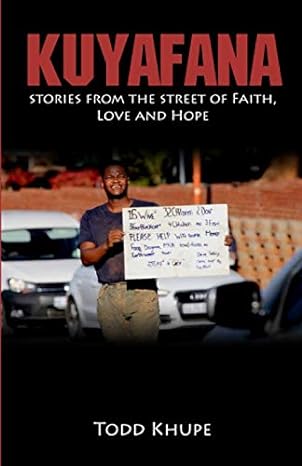“It was time for us to return home in time for the opening of schools. We left [Johannesburg] in the afternoon and we chose to ride on the roof of the train. Just before the train pulled up at New Canada Station, Pule, who was a carriage ahead of us, miscalculated his moves and hit a live wire and within seconds his body had been reduced to charcoal. This was the most horrific thing I had ever seen in my life. I don’t believe I am yet to see anything more horrendous. I sustained minor injuries, so did the other two. Pule’s funeral was unbearable. Speaker after speaker lambasted us. Everything was reduced to the effects of nyaope. The general public’s feeling was that no one in their right minds would endanger their lives in the way we did unless they were under the influence of nyaope.”
In Kuyufana we see lives sinking deep in wretched wickedness, miraculously lifted up.
Above is an excerpt from one of the gripping stories in the book, Kuyafana. Kuyafana is written by Todd Khupe. Khupe serves as assistant pastor at Christ Central Soweto and also serves with several organisations that minister to street children.
Kuyafana, which translates as ‘there is no point,’ is a compilation of five life stories from the streets of Johannesburg that narrate and demonstrate the virtues of faith, love and hope on display in remarkable and moving ways. In it we see lives sinking deep in wretched wickedness, powerfully and miraculously lifted up from the miry clay and placed on a solid rock.

Kuyafana: Stories From the Street of Faith, Love and Hope
Todd Khupe
Kuyafana: Stories From the Street of Faith, Love and Hope
Todd Khupe
A beautiful but heart-rending book containing five bitter-sweet stories about the lives of street children in Johannesburg.
We Inhabit an Evil, Wicked World
This is a heart-wrenching book. It brings you into the reality of the state of fallen man. It reveals the brokenness and hardness of human hearts. We encounter again and again the brokenness of homes and families, as well as systems in society.
Kuyufana shows the ultimate limitations of human systems and structures to curb evil.
It further highlights the horrors of crime, drug abuse, sexual immorality and abuse, death, the strongholds of evil men and organised crime, as well as the power and importance of community. Kuyufana also shows the ultimate limitations of human systems and structures to curb evil and bring about lasting reform. This wicked world and all its wickedness are an overwhelming force that batters a soul, to the point that one can only cry out hopelessly, “There is no point.” What a depressing phrase, rightly capturing the hopelessness of a heart and life under the captivity of sin.
We Need a Powerful Work of God
Thankfully the stories in Kuyafana don’t end in despair. Instead, all of them demonstrate how God encounters people with his love through his people. In each we see how the despised outcasts of society, the marginalised are remarkably cared for by complete strangers. These strangers share a message of hope, telling them about one who is the Lord of their lives and who has the power to save, transform and rescue them from their miserable condition.
All of the stories demonstrate how God encounters people through his people.
Meeting this Lord, they soon realise that their lives truly matter, because everyone and how they live matters to God. So instead of there being no point (kuyafana), the Lord graciously transforms one’s perspective to akufani (it matters). As a master storyteller, Khupe uses the five stories in his book to bring readers face-to-face with the realities of life on the streets, as well as the joys and power of God’s gospel. The people, churches and ministries involved with this outreach work are truly living out true and pure religion (James 1:27).
We Must Tell the Stories of God’s Grace
These stories of faith, love and hope need wide circulation. We need to know and hear these stories, so we can know that there is a point; that we can make a difference. God is concerned for the well-being of the weak and vulnerable. He urges his people to compassion, to care for orphans, widows and the poor.
God urges his people to care for orphans, widows and the poor.
Thus we need to view the vulnerable and marginalised in our communities as image bearers. We must be concerned about their spiritual state and standing before God and tell them Jesus is mighty to save and able to transform their lives. And we must be willing to work and walk with them, so that they become healthy members of society.














